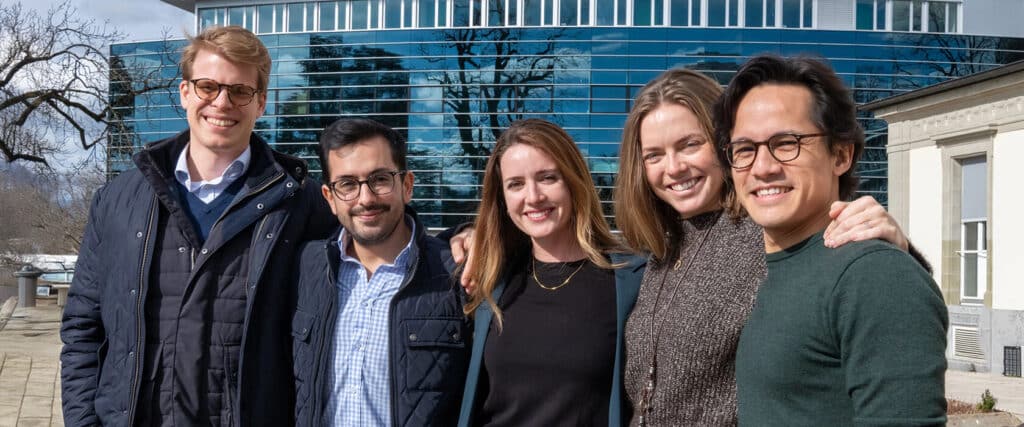Mastering Real-World Challenges: The Audencia MBA Consultancy Project
The Audencia International MBA’s consultancy project is a cornerstone of its International MBA program. Students tackle real company problems, gaining critical leadership skills in an authentic and multicultural setting. This practical experience, coupled with direct company engagement, enhances learning and opens future career opportunities.
Tamim Elbasha, Associate Dean of Learning & Quality Development at Audencia Business School, offers his insight into how this unique program prepares graduates for the complexities of the global business landscape.
Audencia Business School is a highly awarded international institution with campuses in Paris and Nantes in France. The school also has a presence in China, North Africa, and Brazil. They offer a wide range of programs, from bachelor’s to doctor of business administration (DBA). Furthermore, Audenica boasts the triple crown accreditation, a mark of institutional excellence held by less than 1% of business schools worldwide.
What is the Audencia MBA Consultancy Project?
The consultancy project is a key component of Audencia’s International MBA program. “We have a consultancy project which comes towards the second term, and [during] this consultancy project, they work with companies… with real problems.” What results is a truly hands-on experience. (0:33)
Students work collaboratively on these problems. Tamim describes the process, “We split the students into groups, which they will work [on] together during a period of time… to deliver a real solution for real problems for the companies.” The project duration typically spans between two to four weeks. (0:43)
Structure and Duration
During this intensive period, students are not left unsupported. They receive coaching from Audencia faculty. Additionally, the partner companies provide a dedicated team to assist students.
Subsequently, this team offers crucial insight and support as students explore new industries, disciplines, or departments. Thus, it helps them learn about the company and its challenges, leading to better solutions.
Essential Soft Skills Gained Through Practical Application
The Audencia MBA Consultancy Project is designed to cultivate a wide array of essential skills. Students develop crucial soft skills, such as navigating client relationships. Tamim asserts, “Some [students] will go [on to] do consulting afterwards, so [they learn about] dealing with a client, [as] maybe you’ve never done this before.” (1:39)
Therefore, this practical learning experience is particularly valuable for students aspiring to have careers in consulting. Moreover, the project hones your ability to collaborate effectively within a short timeframe, often with new team members. This process effectively mirrors real-world consultancy situations.
Innovative Problem-Solving and Adaptability
Students can innovate by creating new tools, such as unique Excel sheets or novel methodologies. The experience also teaches adaptability, requiring students to work both offline and online, often in parallel with their other assignments. These diverse skills converge within the project’s demanding context.
The Power of a Time-Pressured, Multicultural Learning Environment
Working with companies on a local level, the project is inherently multicultural. This extends beyond national diversity to include differences in industry and discipline. “We learn how to extract the best expertise from others and how we share our expertise with others,” Tamim explains. (2:26)
Cultivating Intercultural Collaboration
The focus of the project is squarely on business, skill-building, and collaborative problem-solving. The time constraint pushes students to focus intensely on one problem. This can be particularly helpful for a first assignment.
Team composition and collaboration in an international context highlight theoretical intercultural concepts in practice. When team members don’t follow the same behaviors or working codes, issues can quickly emerge. Consequently, they must hone their teamwork and communication skills throughout the project.
Focused Learning in a Safe Space
Coaches actively work on business issues that surface to facilitate growth. Tamim asserts the benefit of this controlled environment, “You have your learning in a way that’s safe, you can make mistakes and you can move on and learn from it very quickly.” (3:31)
Building Trust and Accessing Confidential Data
Most companies require students to sign Non-Disclosure Agreements (NDAs). Tamim explains, “Most companies will require an NDA… so they can keep their secrets.” (3:43) Alongside this, Audencia maintains strong relationships with its network of partner companies, fostering trust on both sides.
Companies typically assign a leadership or management team, including one or two dedicated managers to the project. Because these are real-world problems, companies invest their time and resources to get valuable solutions. Consequently, they are willing to provide more detailed, often confidential, information after students sign an NDA. This can include sensitive data such as production figures, geographic locations, and customer information. Through this, students gain critical insights and learn about real-world impact in a first-hand manner.
Structured Client Interaction
Audencia collaborates with companies to clearly define the problem for students. Students have three scheduled sequences to contact the company weekly, depending on their management approach. Audencia teaches students how to manage client relationships, including how to make contact and what questions to ask. This level of access and guidance is possible due to Audencia’s well-established network of companies and partners.
Diverse Projects for Broad Exposure
The consultancy project offers access to a broad range of companies. Tamim says, “We have a wide range of projects from nonprofit to full-profit organizations.” (5:09) Projects involve a wide range of diverse companies, from well-known international firms to local operations. In the past, industries covered have included agriculture and software.
For non-profits, students might help them achieve economic balance or develop sustainable economic models. This could involve designing service delivery for underprivileged populations. (5:13)
In the commercial sector, projects vary significantly. For instance, students worked with a company on its global sales business plan, determining which regions to target beyond 2030. This demonstrates a completely different level of strategy and a shift in approach. (5:25)
Assessment and Significance within the MBA
The consultancy project’s evaluation is split into two parts. Firstly, students must deliver a comprehensive report to the company. Secondly, they must present their findings in the presence of company representatives. This ensures valuable feedback from both an academic and business perspective in the assessment of the final project.
Comprehensive Evaluation Methods
During the presentation, the company provides live feedback to the students. They assess the appropriateness and pragmatism of the proposed solution. This company feedback is a crucial component that the faculty member considers when grading the project.
This grade accounts for both the presentation skills and the content of the report. It is a credit-bearing exercise worth three ECTS (European Credit Transfer and Accumulation System) credits. “It’s quite a lot of work, [but] students love it!” Tamim adds cheerfully. (6:56)
Integrating Prior Knowledge
This assessment comes at a point in the MBA program where students have covered the fundamentals and begun to specialize. This makes it an ideal opportunity to apply their accumulated knowledge.
For example, a student with a marketing strategy background can apply those skills, while also integrating new knowledge in accounting or finance learned during the MBA. It’s a blend of leveraging existing skills and building upon recently acquired knowledge within their project group.
From Consultancy Project to Career Opportunities
For international students in France, this project offers a distinct advantage. Listing work with a French company on their CV is highly beneficial. It also helps them to understand business culture in the region.
Significantly, some projects open doors to internships and jobs. Tamim recalls, “Some of the companies will offer an internship just after [the project]… and very occasionally, they might be turned into a contract.” (7:37) These internships can occasionally lead to contracts, temporary or permanent, within three to six months post-graduation.
Overall, the experience is a valuable resume builder, showcasing exposure to working with French and local companies. All these factors contribute positively to finding employment after the Audencia International MBA.
Audencia MBAs Thrive in The Real World
The Audencia MBA Consultancy Project is far more than an academic exercise. It is an immersive, real-world project. It molds future business leaders.
By tackling authentic company challenges, Audencia MBA students certainly apply theoretical knowledge. Moreover, they forge indispensable soft skills, adaptability, and cross-cultural competencies in a supportive environment.
This unique model, bolstered by strong industry partnerships, provides unparalleled access to real business data and insights into real-world challenges. Ultimately, this immersive experience culminates in industry connections and exciting potential career opportunities. This way, students pave the way for successful internships and long-term employment in leading companies.
The Audencia MBA truly equips its graduates to thrive in the dynamic global economy.
Explore Audencia Business School programs and connect with our student ambassadors to hear firsthand about their experiences at this prestigious institution.





